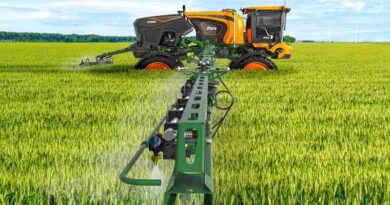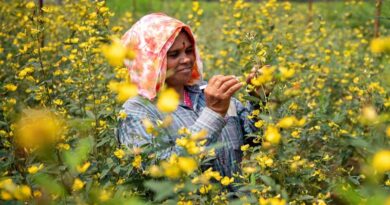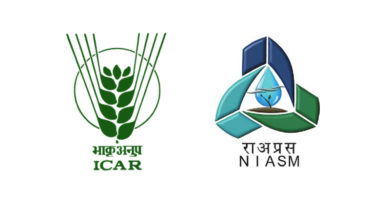Digital Farming 4.0: A Game Changer for Indian Agriculture
Theuns Kotze, Managing Director, Assurance IMETA
11 November 2023, New Delhi: Statistics show that food production must increase by 70% to meet the needs of a growing global population, which is predicted to reach 9.7 billion in 2050. Despite this increased need, the farming industry in India is experiencing labor shortages and climate change. The solution for many farmers in India, and around the world, could be smart farming. This has the potential to bring a number of benefits across society, including advancing traditional farming techniques by delivering higher, more profitable growth and improved food quality, while limiting risks and environmental damage.
Smart farming also referred to as ‘Farming 4.0’ or ‘digital farming’, uses information technology to transform agricultural systems. As McKinsey has set out, the main use of technology in agriculture is for collecting information and making farming more efficient, productive, and predictable. The global smart farming market is predicted to double in five years, going from £10.5 billion in 2021 to nearly £17 billion in 2026. Global spending on smart agriculture is also projected to reach £12.4 billion by 2025.
Smart farming can take many forms. For example, Internet of Things (IoT) technology empowers farmers to capture information to improve their overall production processes, make efficiencies, and prepare for the unexpected. With this data, farmers can also discover which processes could be automated, providing information to help find ways to collaborate and partner with other farms, thus improving productivity, with the focus switched to the areas that most need it. This could also help minimize costs to individual farms and any collectives.
Similarly, data analytics can give farmers detailed information about their operations in real time. Research indicates that farms could generate more than 500,000 data points every day via the use of data analytics solutions, such as sensing the moisture level of soil at different locations within a field. Whereas previously farmers may have simply used their experience to predict the weather, new information technologies can measure and forecast rainfall over a set period, temperature changes, wind speed, and direction, air pressure, and humidity. This can enable them to increase crop precision and accuracy and to monitor quality control so they can adjust processes, ultimately helping them to maximize yields and boost profitability. This type of technology can also make the reporting process much more streamlined and greater insight means farmers can reduce their risks, making forecasting easier.
There is also a link between smart farming and sustainability, with technology able to recognize inefficiencies in processes, reduce food wastage by identifying poor soil health, and enable the use of automated tractors and other machines for more precise sowing and irrigation. Traditional farming can reduce the levels of nutrients and fertility in the soil, eventually resulting in a decline in yields, so it becomes an unsustainable method of farming, with fields effectively becoming redundant until the nutrients are added back into the ground via fertilizers or manures. Smart farming can address many of these issues.
With positive impacts such as improved productivity and profitability via automation and systemization, easier reporting, or yields maximized via insight and precision, smart farming could enable farmers to enjoy a greater quality of life. It could also mean food can be produced via a more effective and sustainable method. When supported by agricultural standards such as Tractors and machinery for agriculture and forestry – Sustainability (ISO 17989), Agricultural machinery – Equipment for sowing, planting, distributing fertilizers and spraying – Recommended working widths (ISO 6720), and Equipment for crop protection – Sprayers – Demonstration track for field crop sprayers (ISO 22763), farmers could start to reap the following benefits from smart farming practices:
1. Improved productivity
2. Increased profitability
3. Help for farmers to prepare for the unexpected
4. Increased crop precision and accuracy
5. Maximized yields
6. Redeployment of skilled labor towards more technically proficient work
7. Help for farmers to enjoy a greater quality of life
8. Improved fuel efficiencies
9. Streamlined reporting
10. Easier forecasting.
As it is a relatively new concept and a rapidly evolving field, the Indian government has been promoting digital agriculture and has launched several initiatives to encourage its adoption. For instance, the Ministry of Agriculture and Farmers Welfare has launched the National e-Governance Plan in Agriculture, which aims to provide farmers with access to information and services related to smart farming. Additionally, the government has launched the Pradhan Mantri Fasal Bima Yojana, which provides crop insurance to farmers to protect them against losses due to calamities, pests, and diseases.
Through the application of technology and innovation in the nation’s agriculture sector, the government of India is encouraging the adoption of smart farming practices. The government is putting into practice the Digital Agriculture Mission (DAM), which consists of the India Digital Ecosystem of Agriculture (IDEA), Farmers Database, Unified Farmers Service Interface (UFSI), Funding to the States on the New Technology (NeGPA), Redesign of the Mahalanobis National Crop Forecast Centre (MNCFC), Soil Health, Fertility, and Profile Mapping. Funding for digital agriculture initiatives utilizing cutting-edge technologies, including Artificial Intelligence and Machine Learning (AI/ML), the IoT, and blockchain is being provided to state governments under the NeGPA program. Drone technologies are being adopted. The government encourages agri-entrepreneurs and supports start-ups in the agriculture industry to encourage smart farming.
As farmers seek to produce enough food to meet the needs of a growing population, smart farming can also offer significant benefits to society globally. With farms potentially generating more than 500,000 data points every day, smart farming can empower farmers to reduce their risks, improve their overall production process, make efficiencies, and help them prepare for the unexpected.
From the Internet of Things (IoT) to sensors, robotics, drones, and artificial intelligence, there are large numbers of tools already in place to help farmers move the dial, boosting productivity and yields while also accelerating progress towards a better society and a sustainable world.
Also Read: Hidden costs of global agrifood systems worth at least $10 trillion
(For Latest Agriculture News & Updates, follow Krishak Jagat on Google News)















